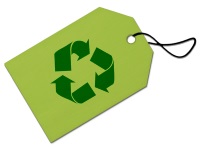Biodegradable products
 Polybags Ltd. now manufacture and stock a wide range of eco-friendly green packaging and biodegradable products to suit your needs and help towards a better environment (both PolyBio and Biodegradable). These include kitchen waste and refuse bags, bin liners, carrier bags and standard bags developed in Polybags laboratories in conjunction with the Polymer Research Department at the London Metropolitan University.
Polybags Ltd. now manufacture and stock a wide range of eco-friendly green packaging and biodegradable products to suit your needs and help towards a better environment (both PolyBio and Biodegradable). These include kitchen waste and refuse bags, bin liners, carrier bags and standard bags developed in Polybags laboratories in conjunction with the Polymer Research Department at the London Metropolitan University.
Common views on bioplastics
United Kingdom, United Kingdom and other European countries require single-use plastics to use PBS or other biodegradable materials, nevertheless their requirements are tighter. They specify that PBS or PBAT contain 40-50 percent of biomaterials (normal fermented grain) so that they can have a biodegradable plastic without creating also much of a strain on the cultivation and supply of grain.
Green Packaging, Inc - Harleysville - Pennsylvania - Polybags
Green Packaging, Inc. was founded in 2007 by an environmental activist who was concerned about the increasing amount of petroleum-based, non-degradable packaging ...
Hot Selling Biodegradable Packaging Disposable Cup Sugarcane Bagasse Paper Cups Coffee Cup
Contrary to what plenty people will tell you, it is absolutely potential to have environmental bags in Melbourne and beyond printed in full colour. Use them to proudly display your emblem or emblem, as well as your commitment to sustainability.
6 Benefits Of Using Eco-Friendly Bags
6 Benefits Of Using Eco-Friendly Bags Gone are the days of utilising plastic bags, they've almost unavailable Polybags
However, if you want to dedicate your new-found downtime to becoming more environmentally responsible, Hethersett in the south may be the optimal place for you. As a designated green village, the parish council is constantly putting forward initiatives on issues like excess street lighting, bio-degradable bags and litter. As a county with a superb mix of lively and quieter areas, you?re sure to come by the perfect retirement spot for you in Norfolk.?
Biodegradable Bags Products +
Distributour of custom biodegradable bags. Type of bags include cellophane and burlap bags. Available in alternative sizes. Same day shipping services are on offer. Made in the United Kingdom.
Global Bioplastics & Biopolymers Market is Trending in Worldwide with Demand, Supply, Net Profit, Expansion Plans & Business Analysis
2.2 Bioplastics & Biopolymers Executive Summary
3.1 Global Compostable Bags Sales Market Share by Players
Sustainable procurement – we now use recyclable alternatives to plastic packaging, like jiffy envelopes with paper pulp inners, paper tape, potato starch bags and craft paper, helping your business to meet its sustainability policy requirements.
Why Degradable or Biodegradable bags/film?
Conventional plastics do not break down. Litter and landfill waste take years, even decades, to degrade. Litter is visual pollution, an eyesore that regulations and educational programs have failed to eliminate. In landfills, not only do ordinary plastics degrade very slowly but also anything contained within them may not reach their full degradation potential. This results in a needless waste of valuable landfill space.
Source biodegradable bags at Packagingknowledge.com
What is biodegradable
Biodegradation is the process by which organic substances are broken down by the enzymes produced by living organisms. The term is often used in relation to ecology, waste management and environmental remediation (bioremediation). Organic material can be degraded aerobically, with oxygen, or anaerobically, without oxygen. A term related to biodegradation is biomineralisation, in which organic matter is converted into minerals.
Biodegradable matter is generally organic material such as plant and animal matter and other substances originating from living organisms, or artificial materials that are similar enough to plant and animal matter to be put to use by microorganisms. Some microorganisms have the astonishing, naturally occurring, microbial catabolic diversity to degrade, transform or accumulate a huge range of compounds including hydrocarbons (e.g. oil), polychlorinated biphenyls (PCBs), polyaromatic hydrocarbons (PAHs), pharmaceutical substances, radionuclides and metals. Major methodological breakthroughs in microbial biodegradation have enabled detailed genomic, metagenomic, proteomic, bioinformatic and other high-throughput analyses of environmentally relevant microorganisms providing unprecedented insights into key biodegradative pathways and the ability of microorganisms to adapt to changing environmental conditions.
Source: Wikipedia.
Degradable vs. Biodegradable vs. Compostable
Compostable Plastic is plastic which is:
capable of undergoing biological decomposition in a compost site as part of an available program, such that the plastic is not visually distinguishable and breaks down to carbon dioxide, water, inorganic compounds, and biomass, at a rate consistent with known compostable materials (e.g. cellulose). and leaves no toxic residue.
American Society for Testing & Materials (ASTM).
In order for a plastic to be called compostable, three criteria need to be met:
- Biodegrade - break down into carbon dioxide, water, biomass at the same rate as cellulose (paper).
- Disintegrate - the material is indistinguishable in the compost, that it is not visible and needs to be screened out.
- Eco-toxicity - the biodegradation does not produce any toxic material and the compost can support plant growth.
Biodegradable Plastic
Biodegradable Plastic is plastic which will degrade from the action of naturally occurring microorganism, such as bacteria, fungi etc. over a period of time. Note, that there is no requirement for leaving "no toxic residue", and as well as no requirement for the time it needs to take to biodegrade.
Degradable Plastic
Degradable Plastic is plastic which will undergo a significant change in its chemical structure under specific environmental conditions resulting in a loss of some properties. Please note that there is no requirement that the plastic has to be degrade from the action of "naturally occurring microorganism" or any of the other criteria required for compostable plastics.
Please visit environmentalbags.com to know more about degradation and the types of degradable bags.
A plastic therefore may be degradable but not biodegradable or it may be biodegradable but not compostable (that is, it breaks down too slowly to be called compostable or leaves toxic residue).
Bioplastics
Bioplastics can take different length of times to totally compost, based on the material and are meant to be composted in a commercial composting facility, where higher composting temperatures can be reached and is between 90-180 days. Most existing international standards require biodegradation of 60% within 180 days along with certain other criteria for the resin or product to be called compostable. It is also important to make the distinction between degradable vs. biodegradable vs. compostable as often these terms are used interchangeably.
Biodegradable or Biodegradeable?
It is very common to misspell biodegradable as biodegradeable (please take note yourself as some of our domains are actually misspelt!) and the same happens with degradable as degradeable. In fact when written down the word biodegradable often looks like an incorrect spelling and has been known to be corrected to biodegradeable by some overzealous and missinformed editors. So, now you know if someone tells you otherwise stick out your guns!
Biodegradable courier bags and mailing bags
For an extensive range of mailing bags including more green options for delivering your products by post to your customers please visit www.mailingbags.co.uk.
Green is the new black
 The choice of packaging used by e-commerce retailers and how well this demonstrates a consideration for the environment affects the purchasing decisions of consumers, according to a packaging survey.
The choice of packaging used by e-commerce retailers and how well this demonstrates a consideration for the environment affects the purchasing decisions of consumers, according to a packaging survey.
Research by strategic logistics partner Dotcom Distribution revealed that 60% of consumers think it is either important or very important that a retailer's packaging is sustainable.
Their 2013 e-Commerce Packaging Survey found that retailers who demonstrate sustainability is a priority are perceived as environmentally friendly, whilst customers themselves like to be seen as environmentally-conscious when deciding on where to shop and what to buy.
"It's clear that a retailer's packaging choice can have repercussions", said Maria Haggerty, president of Dotcom Distribution. "The results of this study show that packaging is not to be overlooked or underestimated for its possible impact on a brand."
Source: Dotcom Distribution 2013 eCommerce Packaging Survey - 'Brown Boxes Don't Deliver for Brands'